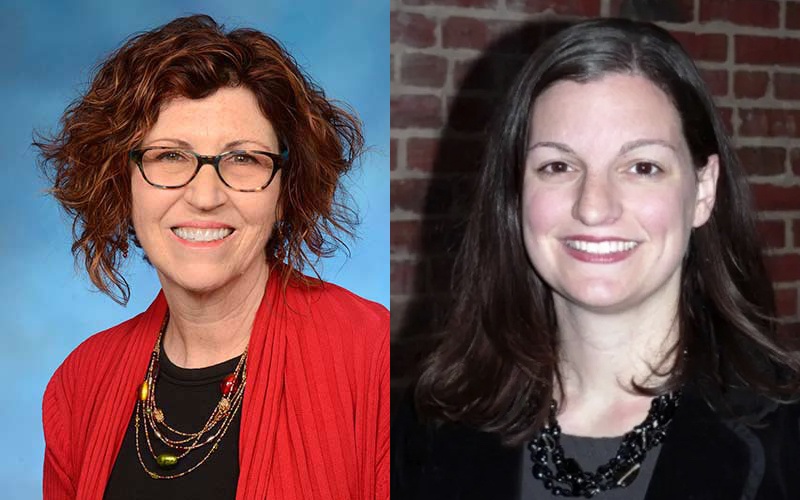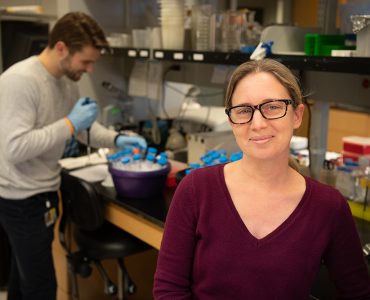
The Jane Addams Resource Corporation (JARC) works to end the cycle of poverty by providing free, accelerated job training in manufacturing and connecting its graduates with meaningful work making a livable wage. JARC has found capable and willing trainees in Baltimore’s most distressed neighborhoods, but in its eight years here, Elaine Carroll, MSW ’12, vice president of strategic initiatives, says she’s lost countless graduates and trainees to overdose and other substance use disorder-related deaths.
“My mother died from her addiction. I’ve been in recovery myself. I have friends who’ve relapsed,” Carroll says. “I’ve seen it and I know what a beast addiction is.”
The University of Maryland Schools of Social Work (UMSSW) and Medicine (UMSOM) aim to generate resources to address barriers to employment faced by adults in recovery from opioid use disorders through the Workplace PROSPER (Partnering to Reduce Opioid Stigma and Promote Employment in Recovery) program. Led by Marianne Cloeren, MD, MPH, associate professor, UMSOM, and Jodi Jacobson Frey, PhD, LCSW-C, CEAP, professor, UMSSW, one stage of the project’s work involved analysis of data such as risk for opioid-related use by industry and incidence of inappropriate opioid prescribing practices. The other was to bring together stakeholders, like Carroll at JARC, to better understand the needs of employers.
According to the Substance Abuse and Mental Health Services Administration’s National Survey on Drug Use and Health released in 2021, 16.5 percent of the U.S. population met the criteria for having a substance use disorder in the past year. A survey from the National Safety Council found that 75 percent of employers report that opioid use has impacted their workplace. However, only 17 percent report being extremely well-prepared to address the issue.
“We spend a lot of time at work,” Carroll said. “How might things be different if the workplace reflected the place where we are as a society with addiction right now? How might things be different if workplaces were more transparent and had more services?”
These were questions Cloeren and Frey have long considered. Together, they have been co-principal investigators on multiple related research studies and projects aimed at addressing the barriers to employment for adults in recovery with a focus on the intersection of work and recovery.
Frey explains that often social work services end at employment. “But I have always viewed, in behavioral health with adults and working families, that the workplace is an untapped environment where education, prevention, intervention, treatment, and support for recovery not only should happen but needs to happen, particularly with the opioid epidemic,” she said.
BHWell Lab’s Five Focus Areas
In 2021, Frey launched the multidisciplinary Behavioral Health and Well-Being (BHWell) Lab at UMSSW with the goal of developing, implementing, and disseminating collaborative research, training, and education. The lab has five key focus areas: mental health and well-being; financial well-being and economic justice; work-life integration; addictive behaviors; and trauma, abuse, and suicide.
Individuals with opioid use disorders face unique challenges, many of which meet at the crossroads of BHWell Lab’s five focal areas. While research shows that employment of patients in treatment is associated with improved treatment adherence and recovery outcomes, people in recovery are more likely to be unemployed. Through a suite of research under the umbrella of “PROSPER projects,” Frey and Cloeren began to understand not only the barriers to employment for those with opioid use disorders, but also the need for employers to have tools to help their employees who have opioid use disorders.
Through Workplace PROSPER, funded by two Centers for Disease Control and Prevention cooperative agreements with the Maryland Department of Health, Frey and Cloeren found that many employers want to be more supportive of their employees with opioid use disorders and in recovery but don’t know how. The roundtable discussions revealed resources and training that could help. Having peer recovery specialists in the workplace emerged as an essential resource.
“Such a huge part of relapse or addiction causing somebody to lose their job is not feeling safe telling anybody about it,” Carroll said. “Making it more accessible and safer for people to come out and express struggle could make a difference.”
Other key takeaways from stakeholder meetings included how to develop protocols around the safe introduction of Naloxone (an overdose reversal medication) into the workplace and the need to review internal policies to make it easier for those in — or out — of recovery to obtain a job and stay employed. For example, Frey said, “Someone who’s taking methadone or buprenorphine, some kind of medication for opioid use, might need flexibility in their work schedule to be able to continue to have access to these lifesaving medications.”
“We developed a toolkit aimed mainly at employers,” Cloeren said, “to help them manage opioids in the workplace in a way that reduces stigma, increases opportunity for people in recovery, and hopefully changes the culture to one that is a safer and more sensitive environment for people who are in recovery or not in recovery and having issues with substance use disorder and need help.”
Toolkit Testing
The web-based toolkit will be beta tested this spring with employment partners like JARC. While the permanent home for the final toolkit has not been determined, once it is live, the PROSPER team will work with employers, workforce development programs, labor unions, and government organizations to spread the word about it. Frey and Cloeren add they will be looking for financial support to further develop industry-specific modules within the toolkit that respond to different workplace cultures so content is relevant for the construction industry as well as appropriate for other industries such as health care.
For Frey and Cloeren, their hope for the future of this work is clear.
“Ultimately, it is to save lives,” Frey said. “To be healthy and stay alive, you need to be working and the workplace needs to be safe and supportive. Without access to those supports, people are dying from overdose and relapsing.”
“We want to be part of a culture shift,” Cloeren added. “Substance use disorder needs to be managed as a chronic illness, not written off as a bad behavior.”



